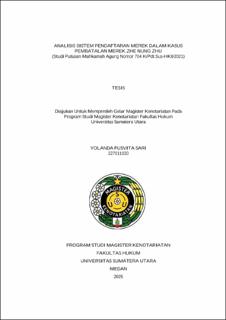| dc.description.abstract | Indonesia, as a country adhering to the "First to File" trademark registration system as stipulated in Law Number 20 of 2016 concerning Trademarks and Geographical Indications, affirms that legal protection is granted to the party who first registers a trademark. However, the application of this principle encounters practical challenges, as demonstrated in the cancellation case of the trademark "Zhe Nung Zhu & Logo," decided by the Supreme Court through Decision No. 704 K/Pdt.Sus-HKI/2021. This study aims to identify the factors that led to the cancellation of the registered trademark based on Law No. 20 of 2016, to analyze Indonesia's trademark registration system in providing legal protection to registered trademarks, and to examine the Supreme Court's legal reasoning in rendering the decision.
This is a normative legal research with a descriptive-analytical character relying on secondary data, including primary, secondary, and tertiary legal materials. Data were collected through a literature review by analyzing various relevant documents and processed using qualitative analysis.
Based on the analysis of the "Zhe Nung Zhu & Logo" cancellation case, the study concludes that the grounds for trademark cancellation include: contradiction with state ideology, legislation, morality, religion, decency, or public order; lack of distinctiveness; bad faith registration; and substantial or overall similarity with a previously registered trademark. Indonesia's trademark registration system offers layered legal protection through preventive mechanisms (administrative and substantive examination) and repressive measures (civil and criminal sanctions, as well as cancellation procedures). In Decision No. 704 K/Pdt.Sus-HKI/2021, the Supreme Court applied Article 21 paragraph (1) letter (a) of Law No. 20 of 2016, considering that the "Zhe Nung Zhu & Logo" trademark owned by Darma Iliadi bore essential similarities to the "Logo" trademark owned by Dhalim Soekodanu, which had been registered since May 29, 1991. The registration was also deemed to be made in bad faith. Thus, the trademark cancellation was necessary to protect the rights of the legitimate owner and to prevent consumer confusion. | en_US |


